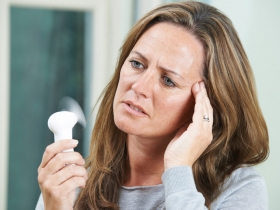Primary Ovarian Insufficiency - Early Menopause
Every woman’s fertility can last a different amount of time. Some say this is encoded in our DNA, others think that a combination of genetic and external factors may influence this.
Overall, specialists believe that, on average, women's fertility age lasts until their late 40s or early 50s. They lose fertility when their ovaries stop producing hormones such as estrogen and progesterone, as well as eggs.
What is POI
However, for some women, this can happen much earlier. In those cases, they are considered to have primary ovarian insufficiency (POI), also known as premature ovarian failure or early menopause. POI can happen suddenly or occur after months or years of irregular periods.
What causes POI
The cause of this condition is very often unexplained [1]. Still, factors that have been identified as causes of POI are:
- Genetic abnormalities like Turner and Fragile X syndrome
- Autoimmune disorders, such as rheumatoid arthritis, hyper or hypothyroidism
- Chemotherapy, radiotherapy
- Some conditions and infections, such as HIV
- Environmental factors - exposure to radiation or toxic chemicals
If the women in your family have had a history of POI, you should speak with your healthcare provider because you may be at risk for it too.

Symptoms of POI
POI usually presents with irregular menstrual periods or months without a period at all. Sometimes POI occurs suddenly with a stop of the monthly periods.
Most often, women experience symptoms similar to the symptoms at the beginning of the menopause. Others may not have any complaints at all.
If you notice any of the following symptoms, it might be a good idea to consult with an OBGYN specialist:
- Irregular or missing monthly menstruation
- Difficulty getting pregnant
- Low libido
- Hot flashes and night sweats
- Troubles with concentration, sleep
- Changing moods
- Vaginall dryness
- Painful intercourse
What can be done about it?
Unfortunately, no known treatments for POI can reverse the condition. However, about a quarter of people with this ovarian insufficiency may have menstruation at least once a year.
Some of the available treatments, like hormonal or non-hormonal therapies, can alleviate the symptoms of the condition, but will not restore the function of the ovaries, therefore, won’t improve fertility.
If you are at high risk for POI and you want to secure your chances of getting pregnant at some time in the future, you should consult with a fertility specialist and consider an egg-freezing procedure.
The best option if you are already suffering from POI but trying to conceive is to use donor eggs.
However, even if you are not trying to conceive, in order to maintain your health, you should talk with your doctor if you have missed three consecutive menstruation periods. Due to the condition, your estrogen levels decrease, which can put you at risk for other health problems like osteoporosis, heart disease, underactive thyroid, anxiety, and depression.
Sources:
- Rudnicka, E., Kruszewska, J., Klicka, K., Kowalczyk, J., Grymowicz, M., Skórska, J., Pięta, W., & Smolarczyk, R. (2018). Premature ovarian insufficiency – aetiopathology, epidemiology, and diagnostic evaluation. Przeglad Menopauzalny, 17(3), 105–108. https://doi.org/10.5114/pm.2018.78550
- Professional, C. C. M. (n.d.). Primary Ovarian Insufficiency. Cleveland Clinic. https://my.clevelandclinic.org/health/diseases/17963-primary-ovarian-ins...
- What is premature ovarian insufficiency (also called premature ovarian failure)? (n.d.). https://www.reproductivefacts.org/news-and-publications/patient-fact-she...






